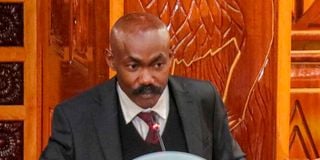Premium
Victim of his own success? Lawyer Elisha Ongoya fights to shut down online parodies riding on his name

Lawyer Elisha Ongoya.
Lawyer Elisha Ongoya, who became a bigger household name during the recent impeachment hearing of Rigathi Gachagua after grilling legislator Mwengi Mutuse at Senate, has raised concerns about the proliferation of social media parody accounts using his name.
In a letter addressed to both the Communications Authority of Kenya (CA) and National Police Service, Mr Ongoya wants the social media accounts — now numbering more than 50 — looked into and shut down.
Since the hearings at Senate, the fake accounts on X (formerly Twitter), Facebook and Tiktok have mushroomed. He reckons that the accounts are not only damaging to his professional reputation but also pose a wider threat to the integrity of online discourse.
“People could easily mistake these accounts for mine and attribute statements to me that I never made. It's a form of online identity theft that should not be taken lightly,” Mr Ongoya says in his complaint.
He has listed the fake accounts by username — 46 on X, 7 on Facebook and 3 on Tiktok — that he wants taken down.
"The purpose of this is to request that you investigate the IP addresses that registered and that are using these accounts online. We also request that you...close down these accounts directly or get the respective service providers to close them down."
Read: Sonko withdraws case against student accused of impersonating him online, posting obscene images
What the law says
His call for action draws on Kenya's existing legal framework governing online communications and cybersecurity. Under the Computer Misuse and Cybercrimes Act of 2018, impersonation and the creation of fake profiles is illegal, and those found guilty can face serious penalties, including imprisonment.
By invoking this law, Mr Ongoya is urging the authorities to act decisively to investigate the accounts in question.
The law states that any form of cybercrime, including impersonation, is punishable by fines and imprisonment, and the lawyer hopes his case can set a precedent for others facing similar issues in Kenya's rapidly evolving digital landscape.
In his complaint, My Ongoya also emphasised the need for greater oversight and monitoring by social media platforms themselves. He argued that platforms such as X and Facebook need to improve their identity verification processes to prevent fraudulent accounts from flourishing.





